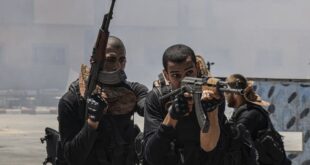GAZA CITY (AP) — Security forces loyal to moderate Palestinian President Mahmoud Abbas and a new army run by the Hamas-led government paraded through the streets with assault rifles and stared each other down Thursday, competing for control of the Gaza Strip.
Abbas ordered the Islamic fighters to remove the group from the streets, but Hamas refused. Officials in Abbas’ office said he would not use force, fearing a civil war — but his restraint risked making him look weak and increasingly unable to keep the fighters in check.
On Thursday, the confrontation in Gaza was confined to shouting and strutting, but both sides feature fighters who have extensive experience in using the weapons they brandish, and a flare-up could be only another insult away.
About 2,000 Fateh supporters in military formation, many bare-chested, double-timed through a main street of Gaza City, shouting, “Jerusalem, the president, the homeland,†clapping and whistling as they passed Hamas activists.
However, no one made a move.
Similar scenes played out up and down the seaside territory. Competing forces patrolled, studiously ignoring each other.
The power struggle began after Hamas was the surprise winner of a January parliamentary election, forming a government several weeks later to replace Fateh, the movement that ruled Palestinian politics for decades under the firm hand of Yasser Arafat, who died in 2004.
Abbas, elected to replace Arafat in January 2005, has another three years to serve as president, regardless of who controls the Cabinet. He has been systematically trying to reduce Hamas power, while trying to persuade the world to deal with him directly, including funnelling vitally needed foreign aid through his office to bypass the Hamas-led government, which is facing a Western boycott.
Hamas is not making direct threats against Abbas. Its tactic has been to go about its business and ignore the demands of the 70-year-old Fateh leader, who has yet to cut an impressive figure as Arafat’s successor.
Hamas called Abbas’ bluff on Thursday, flatly refusing to follow his order to take its new 3,000-man force off the streets. Abbas aide Tayeb Abdul Rahim said the president would deal with this as a legal matter, ruling out an armed confrontation.
Interior Minister Said Siyam of Hamas deployed the unit Wednesday, in defiance of Abbas’ orders to disband it.
Hamas fighters armed with assault rifles, grenades and anti-tank missiles took up positions in the streets, and in one case put down a peaceful protest by college graduates seeking teaching jobs.
Fateh responded with demonstrations in Gaza City and stepped-up patrols throughout the territory.
Gen. Suleiman Hilles, commander of Fateh-dominated Palestinian security forces in the West Bank and Gaza, said the forces were deployed to send a message that “the Palestinian police is the only side that can maintain law and order.†However, the lines were not clearly drawn, since some of the police officers also back Hamas. Several hundred police officers met Thursday with Palestinian Prime Minister Ismail Haniyeh of Hamas and professed their loyalty to the government. Haniyeh told the officers that the new unit of fighters was formed legally and that it would work alongside the security forces.
Even before the January election put Hamas in power, Abbas avoided confronting Hamas and other groups, hoping to tame them through negotiations. Now he clearly fears an all-out civil war, though activists on all sides insist their weapons should be directed against Israel, not each other.
The unprecedented Hamas-Fateh friction, including deadly drive-by ambushes against two Hamas activists in Gaza earlier in the week, came alongside new efforts to explore a possible revival of Mideast peace contacts.
Abbas was to hold talks Sunday with Israeli Foreign Minister Tzipi Livni, the first high-level meeting since Hamas came to power, Palestinian official Saeb Erekat said.
Israel has said it would not resume negotiations, even with Abbas, unless Hamas softens its violently anti-Israel views.
Without a Hamas about-face by the end of the year, Israel plans to begin drawing its final borders with the Palestinians under Israeli Prime Minister Ehud Olmert’s “consolidation†plan.
Olmert was to make his first trip to Washington as prime minister next week and was expected to come under US pressure to try to negotiate a deal with Abbas, rather than move unilaterally.
Vice Premier Shimon Peres told European diplomats on Thursday that Israel, too, prefers a negotiated settlement and would take unilateral steps “only if we are unable [to negotiate] because of lack of a partner,†according to a statement from his office.
 Eurasia Press & News
Eurasia Press & News
